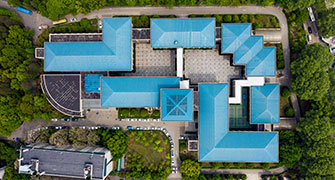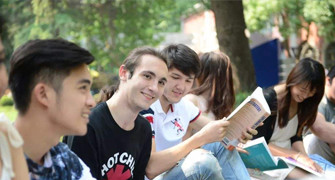Conference Notice
1. Conference Program
This guide primarily concerns with the Registration, Dinner, Transportation and the weather. Please refer to the Conference Program for more detailed timetable of presentations.
2. Registration
For participants staying at the LuoJia Hills Hotel, we will have a registration table in the hotel lobby on the 14th.
For other participants, the registration time is on the morning of the 15th, onsite at room A221, School of Economics and Management
3. Conference Meals
1) March 15th
Lunch ——Luojia Villa
Supper——LuoJia Hills Hotel
2) March 16th
Lunch —— Luojia Villa
4. Transportation
LuoJia Hills Hotel
Address: No.19 East Lake South Road, Wuchang District, Wuhan, Hubei
Province, near Yangbo Gate of Wuhan University.
a) From Tianhe Airport: about 38km;
Taxi: about 50 minutes, about ¥100;
b) From Wuhan Station: about 15 kilometers;
Taxi: about 30 minutes, about ¥50;
c) From Wuchang Railway Station: about 8km;
Taxi: about 17 minutes, about ¥25;
d) From Hankou Railway Station: about 18km
Taxi: about 40 minutes, about ¥60;
Conference Program
Date | Time | Topic |
March14th, 2025 | 12:00-20:00 | Check in |
March 15th, 2025 | 8:30-8:45 | Opening Ceremony & Photo |
8:45-9:45 | Plenary Session I | TRUTH BY CONSENSUS
Prof. Gabriele Camera (Chapman University)
Room 378 |
9:45-10:15 | Break & Rest |
10:15-11:45 | Parallel Session I | A1(Room 378): Bargaining & Negotiation |
B1(Room 380): Experimental Finance |
C1(Room 382): Online Experiments |
11:45-13:30 | Lunch |
13:30-15:00 | Parallel Session II | A2(Room 378): Contests & Competition |
B2(Room 380): Fairness and SelfImage |
C2(Room 382): Public Goods |
15:00-16:30 | Parallel Session III | A3(Room 378): Market Design |
B3(Room 380): Lab in the Field |
C3(Room 382): Public Goods |
16:30-17:00 | Break & Rest |
17:00-18:00 | Plenary Session II | Information Sharing in Financial Markets: An Experimental Asset-Market Approach
Prof. Yohanes Eko Riyanto (Nanyang Technological University)
Room 378 |
Dinner |
March 16th, 2025 | 9:00-10:30 | Parallel Session IV | A4( Room 378): Coordination Games |
B4( Room 380): Information and Individual Choice |
C4( Room 382): Labor Economics |
10:30-11:00 | Break & Rest |
11:00-12:00 | Plenary Session III | Information Aggregation in Markets?
Prof. Cary Deck (University of Alabama)
Room 378 |
12:00-13:45 | Lunch |
14:00-17:00 | Visiting and inspecting a technology company |
Parallel Session Schedule
March 15th, 2025 |
8:30-8:45 | Opening Ceremony & Photo |
8:45-9:45 | Plenary Session I | TRUTH BY CONSENSUS | Gabriele Camera | Chapman Universit |
9:45-10:15 | Rest |
10:15-11:45 | Parallel Session I |
A1
Room 378 | Bargaining & Negotiation |
Bargaining games with player labels | Shuo Yang | The University of Nottingham Ningbo |
Do people choose the LOSS contract more than the GAIN contract? | Zexiyue Cheng | Osaka University |
Timely Negotiations | Manshu Khanna
(Chair) | Peking University HSBC Business School |
B1
Room 380 | Experimental Finance |
Small ponds are best to motivate performance with relative feedback | Hanlin Lou | University of New South Wales |
Financially Incentivized Social Endorsement Improves Market Efficiency | Mei Gao | Shanghai International Studies University |
The Impact of Stock Market Crashes and Recoveries on Investor Expectations and Disposition Effects——A Lab-in-the-field Experiment | Binglin Gong
(Chair) | East China Normal University |
C1
Room 382 | Online Experiments |
Risk and Ambiguity:Unpacking Uncertainty in Platform Rewards Design | Tong V. Wang | Dongbei University of Finance and Economics |
Carbon inequality changes public support for carbon taxes and low-carbon actions: Evidence from an online experiment | Yu Gao | Peking University |
Motivated Forecasts: Evidence from the Presidential Elections in Argentina | Diego Marino Fages
(Chair) | Durham University |
11:45-13:30 | Lunch |
13:30-15:00 | Parallel Session II |
A2
Room 378 | Contests & Competition |
Sandbagging or Bluffing in Contest— Theory and Experiment | Wei Tang | Southwestern University of Finance and Economics |
Gender differences in the influence of survey competitiveness, tournament entry, and hypothetical choices on individual and partner incomes and work hours | David Ong | Jinan University-University of Birmingham Joint Institute |
(Sub-)optimality and Remedies of the Majority Rule in Team Contests: Theory and Experiments | Changxia Ke
(Chair) | Queensland University of Technology |
B2
Room 380 | Fairness and Self Image |
Social Norms, Observability, and White Lies | Songhua LIU | Shandong University |
Limited Power of Outside Options: New Evidence from Ultimatum Games | Qichao Shi | Southwestern University of Finance and Economics |
Dictators and Lying Dictators | Jason Shachat
(Chair) | Durham University |
C2
Room 382 | Public Goods |
Coordination via Assurance: A Lab-in-the-Field Threshold Public Goods Experiment | Shuwen Li | WU Vienna |
Social Identity in Network Formation | Ying Chen | University of Nottingham Ningbo China |
Taxation, Growth, and Inequality: Experimental Insight from Dynamic Public Good Games | Gergely Horvath
(Chair) | Duke Kunshan University |
15:00-16:30 | Parallel Session II |
A3
Room 378 | Market Design |
Knowing more' and 'Step by step': Correlation neglect under preference uncertainty in centralized school choices | Jin Di Zheng | Huazhong University of Science and Technology |
Overcoming Medical Overuse with AI Assistance: An Experimental Investigation | Lian Xue | Wuhan University |
Affirmative Action and Discriminatory Beliefs | Andis Sofianos
(Chair) | Durham University |
B3
Room 380 | Lab in the Field |
Occupational Certifications and Employability: The Roles of Applicant Ability and Job Quality | Weiguang Deng | Hunan University |
The Role of Generative AI in Human Creative Processes: Experimental Evidence | Feng Zhu | Nankai University |
Matching-LLM: Predicting Public Opinions Using Large Language Models | Lijia Wei
(Chair) | Wuhan University |
16:30-17:00 | Break & Rest |
17:00-18:00 | Plenary Session II | Information Sharing in Financial Markets: An Experimental Asset-Market Approach | Yohanes Eko Riyanto | Nanyang Technological University |
March 16th, 2025 |
9:00-10:30 | Parallel Session IV |
A4
Room 378 | Coordination Games |
Sabotaging a Teammate without Reason: Experiments on the Impact of Bonus Payments | Sookie Xue Zhang | Zhongnan University of Economics and Law |
Incentive design in asymmetric coordination games | Jierui Yang | Tilburg University |
Equilibrium Transitions in Sampling Dynamics: An Experimental Investigation | Zhi Li
(Chair) | Xiamen University |
B4
Room 380 | Information and Individual Choice |
Utility from Anticipation and Delayed Consumption | Lingguo Xu | The University of Melbourne |
Preferences for relative performance information: evidence from the laboratory | Jianing Chen | Beijing Foreign Studies University |
Appetite for Ignorance: Does eating meat cause information avoidance about its harms? | Shanshan Zhang
(Chair) | Wuhan University |
C4
Room 382 | Labor Economics |
The Behavioral Effects of Remote Work on Reimbursement under Managers Approval Authority in Hierarchical Organizations | Qinjuan Wa | Huazhong Normal University |
Advice Giving—A Performance Booster for Remote Workers? | Feng Qin | Chinese University of Hong Kong |
The Incentive Effect of Disappointment Aversion in Stochastic Contract under Limited Liability | Maoliang Ye
(Chair) | Southern University of Science and Technology |
10:30-11:00 | Break & Rest |
11:00-12:00 | Plenary Session III | Information Aggregation in Markets? | Cary Deck | University of Alabama |
12:00-13:45 | Lunch |
March 17th, 2025 |
Return journey |
CBER OVERVIEW
Established in 2017, our Research Center for Behavioral Science,located at the School of Economics and Management, Wuhan University, is equipped with two main servers and 80 semi-enclosed computer terminals, and utilizes a multi-platform integrated participant management and data collection system to provide an open experimental platform supporting research in economics and marketing. Under the leadership of Professor Lijia Wei, the CBER has developed a highly robust team and mechanism for both laboratory and field experiment operations, and have established extensive scientific research and student training collaborations with numerous oversea scholars and institutions. Currently, we are actively engaged in several AI-related research projects supported by the National Natural Science Foundation of China (NSFC).
PREVIOUS WORKSHOPS
The Second Wuhan Cherry Blossom Workshop on Experimental Economics was successfully held from March 23 to March 24, 2019 at the School of Economics and Management of Wuhan University. Professor Daniel Zizzo, Dean of the School of Economics at the University of Queensland, Australia, Professor Stefan Trautmann from Heidelberg University in Germany, and Professor Syngjoo Choi from Seoul National University in Korea delivered three highly insightful keynote speeches.
The Inaugural Wuhan Cherry Blossom Workshop on Experimental Economics, co-hosted by the School of Economics and Management of Wuhan University and the School of Economics and Business Administration of Central China Normal University, was held on March 17–18, 2018 at Wuhan University. The keynote speeches were delivered by Professor James C. Cox of Georgia State University, Prof Chunlei Yang of Nanjing Audit University and Professor Ernan E. Haruvy of the University of Texas at Dallas.
CONFERENCE ORGANIZERS 会议组织者:
Jason Shachat
Lijia Wei (魏立佳)
Xiang Sun (孙祥)
Lian Xue (薛莲)
Junze Sun (孙君泽)
ShanShan Zhang (张珊珊)
CONFERENCE SECRETARY 会议秘书:
Wenjuan Sun (孙文娟)
Qi Yan (颜齐)
 Faculty and Staff
Faculty and Staff Academics
Academics International Exchange
International Exchange







